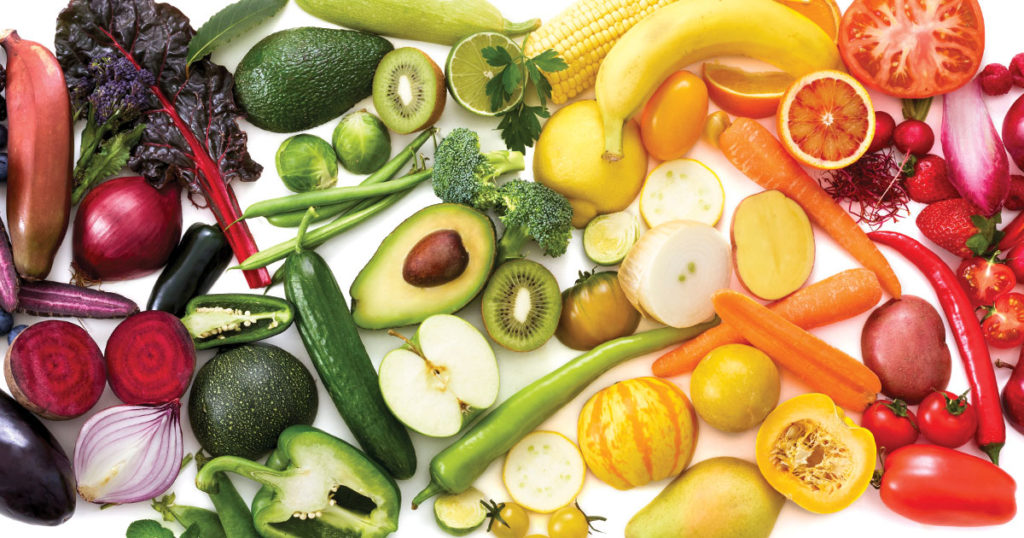There is something to be said about including whole, minimally processed foods in your eating plan. In fact, consuming nutritious whole foods has well–researched health benefits.
Unfortunately, many people gravitate toward the convenience of ultra-processed foods such as chips or cookies, which contribute little to no nutrition but provide plenty of “empty” calories. Ultra-processed foods make up more than half of the total dietary energy consumed in the United States (1). Although these products may be convenient, population-based studies have shown that these foods are typically full of unhealthy fats and salt, low in dietary fiber and protein, and contain very few vitamins or minerals (2). Engineered for taste and reward, ultra–processed foods may drive overconsumption and weight gain. Fortunately, there are many whole food options that are as delicious and convenient as they are nutritious.
The benefits of whole foods should convince even the pickiest eater to grab a healthier option off the shelf. Whole fruits and vegetables, for example, are nutrient dense, rich in vitamins, minerals and fiber, and relatively low calories. Additionally, extensive studies suggest people who eat more fruits and vegetables live longer and healthier lives (3,4). Plus, a diet that includes many different fruits and vegetables, whole grains, and lean proteins delivers nutrients in their naturally occurring forms as well as a full spectrum of vitamins referred to as vitamers. This diversity of vitamers ensures you receive the full benefits of the vitamin.
Whole food benefits don’t just come from vitamins and minerals, but from powerful phytonutrients as well. Phytonutrients are unique compounds found in fruits, vegetables, and other plant-based foods that support good health (5). Their unique benefits include maintaining healthy function of blood vessels and the immune system, as well as the retina of the eye (6). Additionally, resveratrol, a well-studied phytonutrient identified in more than 70 different plant species, has been studied for its benefits in supporting metabolism and healthy aging (7, 8).
Ultra-processed foods – although convenient – offer little nutrition overall. Scientific research demonstrates that an increase in dietary intake of ultra-processed foods results in deterioration of the nutritional quality of the overall diet (2,9,10).
Luckily, overwhelming scientific evidence supports the benefits of a diet full of fruits, vegetables, and other whole, minimally processed foods. These nutrient dense foods are rich in vitamins, minerals, and fiber and are relatively lower in calories when compared to ultra-processed foods. Eating whole foods contributes so many benefits that the typical “junk food” diet simply cannot.
References
- Baraldi LG, Martinez Steele E, Canella DS, Monteiro CA. Consumption of ultra-processed foods and associated sociodemographic factors in the USA between 2007 and 2012: evidence from a nationally representative cross-sectional study. BMJ Open. 2018;8(3):e020574
- Moubarac J-C, Batal M, Louzada ML et al. Consumption of ultra-processed foods predicts diet quality in Canada. Appetite. 2017;108:512-520.
- Schwenke DC. Focus on fruits and vegetables to reduce cardiovascular disease and all-cause mortality. Curr Opin Lipidol. 2013;24(6):526-527.
- Aune D, Giovannucci E, Boffetta P, et al. Fruit and vegetable intake and the risk of cardiovascular disease, total cancer and all-cause mortality-a systematic review and dose-response meta-analysis of prospective studies. Int J Epidemiol. 2017;46(3):1029-1056.
- Liu RH. Health benefits of fruit and vegetables are from additive and synergistic combinations of phytochemicals. Amer J Clin Nutr. 2003;78:517S-520S
- Potter AR. Reducing vitamin A deficiency: Could save the eyesight and lives of countless children. BMJ. 1997;314:317-318.
- Fremond L. Biological effects of resveratrol. Life Sci 2000;66:663-673.
- Singh AP, Singh R, Verma SS, Rai V, Kaschula CH, Maiti P, Gupta SC. Health benefits of resveratrol: Evidence from clinical studies. Med Res Rev. 2019;39(5):1851-1891.
- Rauber F, Louzada MLC, Steele EM et al. Ultraprocessed food consumption and chronic noncommunicable diseases-related dietary nutrient profile in the UK (2008–2014). Nutrients 2018;10(5):587.
- Louzada MLDC, Ricardo CZ, Steele EM, Levy RB, Cannon G, Monteiro CA. The share of ultra-processed foods determines the overall nutritional quality of diets in Brazil. Public Health Nutr. 2018;21(1):94-102.
The post The Benefits of Whole Food Nutrition appeared first on Isagenix Health.
Source: IsagenixHealth.net


You May Also Like
Post-Workout Super Shake
Winter Trail Mix
Apple Spice Granola
IsaDelight Bark With Caramel Brulée Drizzle
Caramel Brulée Cookie Dough Bites
Homestyle Chicken Noodle Soup
BĒA Super Sparkler
Peppermint Mocha Shake
IsaDelight Cashew Butter Cups
Plant-Based Banana Bread
Nature Oat Bake Granola
Nature Oat Bake Isa-Cream Sandwiches
Nature Oat Bake Skewers
BEA Mango Mimosa Slushie
Plant-Based Strawberry Ice Cream
Plant-Based Strawberry Crepes
Plant-Based Strawberry Muffins
Superpower Elixir
Plant-Based Maple Pecan Protein Balls
Immune-Boosting Oats
Celebration BĒA Sparkler
Bone Broth Chicken Gravy
Kale & Sausage Bone Broth Soup
IsaDelight Reindeer Bark
Holiday Charcuterie Board
Leftover Turkey and Vegetable Soup
Protein Chocolate Mug Cake
Vanilla Protein Coffee Creamer
Greens Lavender Iced Matcha Latte
Isagenix Greens Salad Dressing
Everyday Ginger-Infused Cleanse Tea
Choco-Lava Mug Cake